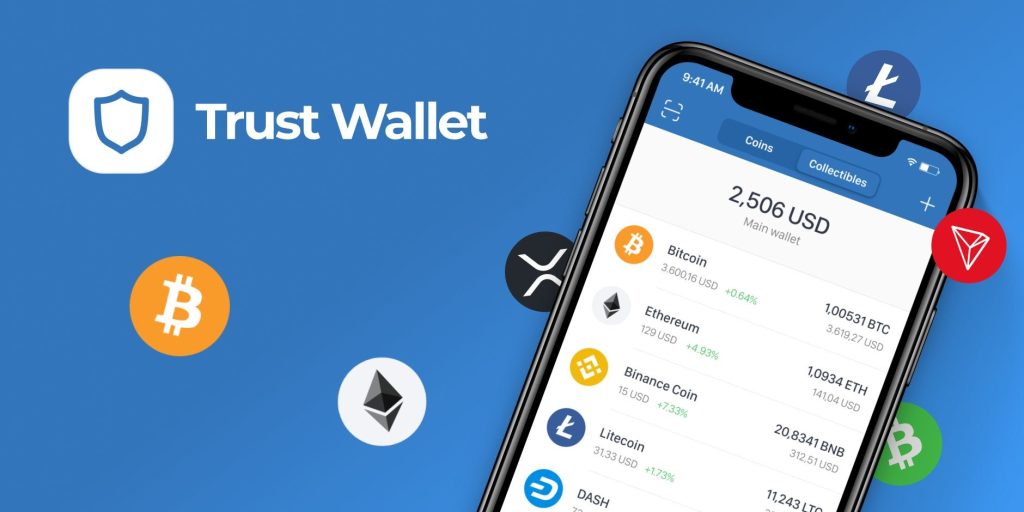If you’re wondering what the best crypto wallets are, you’re in the right place. In this article, we’re going to cover the different types of wallets, discuss how they compare to each other, and then I’ll give you a list of wallets you can try for yourself.
What is the most secure crypto wallet?
As mentioned throughout this site, the safest way to store your cryptocurrencies is by using a hardware wallet (otherwise known as a “cold” wallet).
A hardware wallet is physical device that you hold in your hand, and when you want to make transactions, you connect it to software wallets. The great part about them is that a transaction can only be authorized by physically pushing the buttons on the device.
Why are hardware wallets more secure than mobile wallets?
In addition to the requirement of having to hold the wallet in your hand while performing transactions, a hardware wallet offers several other benefits vs. using a mobile or desktop wallet.
For starters, they enable you to store your private keys OFFLINE. When setting up a mobile or desktop wallet, your private recovery phrase gets displayed on your phone or computer screen.
If you have spyware installed on your devices, it’s possible for a snapshot to be taken at the precise moment when that sensitive information is being displayed.
I’m far from an expert when it comes to how hackers operate, but John McCafe is.. and from 4:40- 7:30 in the video below, he discusses the risks of using mobile and desktop wallets.
When you go through the setup process of setting up a hardware wallet, your recovery words (aka. your “seed phrase”) gets displayed via the screen on your hardware device, which isn’t connected to the internet.
This enables you to write down your phrase and store it safely with the peace of mind of knowing that it was never exposed online.
Hardware wallets require a passcode to access the device, as do most mobile wallets. The difference, however, is that mobile wallets are prone to attacks via keyloggers and screencaptures (as John McAfee mentions in the video above).
Now, all that being said.. that’s not to say that mobile and desktop wallets don’t have their uses. They certainly do, as they’re quite convenient.
Why to use both hardware and mobile wallets?
For the bulk of your coins, it’s safest to keep them stored on a hardware device. Think of a hardware wallet like the crypto equivalent of a savings account. A mobile wallet, on the other hand, can be viewed like a checking account.
Mobile wallets are much more convenient for day to day transactions. So, if you’re someone who uses your crypto to pay for things (hopefully you are), then just send small amounts to your mobile wallet to periodically top up your balance.
What are the best hardware wallets?

Ledger: I can only speak from experience regarding the Ledger wallets, and I think they’re great. They’ve proven themselves to be secure, they’re easy to set up, and they allow you to manage coins/tokens from over 5000 different projects.
Also, if a software wallet supports a hardware wallet connection, Ledger is pretty much always one of the options (and sometimes, it’s the only option).
One thing worth noting is that when buying a hardware wallet, it’s good practice to be selective about where you make your purchase.
If you want to get one from their official website to ensure authenticity, you can do so here.
Note: your recovery words will be generated by the device when you go through the setup process. If your recovery words are provided to you in any other way, there’s something shady going on.
Trezor: This is another popular hardware wallet option. I’ve never personally used one though, reason being is that they don’t support nearly as many coins/tokens as Ledger does. The third party software connectivity is lacking in comparison as well.
For example, if you want to use the Keplr wallet extension to manage your Cosmos ecosystem tokens, and you want to do so via the security of a hardware wallet, then Ledger is your only option. There are many such examples of this.
Other hardware wallets: Ledger and Trezor are the two most popular options, however, there are others to choose from. A few you can look into are KeepKey, CoolWallet and BitBox02. Keep in mind though, that these options don’t support nearly as many coins as the Ledger does. If you’re only investing in Bitcoin, ERC-20 tokens and a few of the other high cap coins, then they’ll accommodate you.
What are the best mobile crypto wallets?
Alright, so we’ve covered your hardware wallet options (for your “savings account”). Now.. let’s discuss some of the mobile crypto wallet options to make those day to day transactions more convenient.
Note: This isn’t financial advice or a personal endorsement. Whatever wallet you choose, understand that there’s risks and personal responsibility that comes with self-custody of your funds.
The two most important features you should look for when choosing a mobile wallet are..
- Self custody: Meaning.. you keep your private keys/recovery phrase
- Open source: Meaning.. the code is public and is subject to scrutiny by the community
Trust Wallet

Trust wallets fits both of the above criteria. Not only is it a self custody wallet with open source code, but they support coins/tokens from over 60 different blockchains. They also have a section for your NFT collections as well (if you’re into that).
Trust wallet also has an in-built exchange feature that allows you to swap certain coins and tokens within the app. There does seem to be limitations with this though, as not all currency pairs are available.
In addition to the swaps, you can also make purchases with fiat within the wallet as well.
Trust wallet was acquired by Binance in 2018, and with that backing, the userbase skyrocketed. As of the time of this writing, the wallet has been installed on over 60 million devices.
Security wise, you’re still better off going with a hardware wallet, but in terms of mobile options, your private keys will be locally stored and encrypted on your device – which aren’t broadcasted to any networks. The wallet can also be secured via pin code and biometics (no biometics for me, personally).
While Binance owns Trust wallet, you don’t need a Binance account to use it. It’s completely independent, and you can download it for free for both Android and iOS. No KYC required either.
It also comes equipped with a fully functioning Web3 DApp browser built into the app, enabling users to interact with decentralized applications such as Uniswap, Aave, Compound Finance, and PancakeSwap on the Ethereum or Binance Smart Chain networks.
Exodus Wallet

Exodus has strong security features, a beautiful design, and based on the feedback I’ve heard.. excellent customer support. The Exodus team respects the privacy of its users, which is why it is one of the most widely used wallets in the crypto community. As you would expect, there’s no KYC requirement for this wallet either.
The wallet comes with a beginner-friendly user interface, making it easy to monitor and track a portfolio at a glance. Additionally, the wallet supports over 225 assets, allows for direct asset exchange within the wallet, and enables users to stake assets for passive income rewards.
The Exodus wallet has a few limitations, such as not supporting storage of NFTs and not having browser support, making it less suitable for connecting to DeFi applications. The wallet integrates with the Trezor hardware wallet, but not the Ledger one, which is a shame because throughout the crypto space.. The Ledger has more integrations. Overall though, if you’re looking for a good mobile wallet.. Exodus is a popular choice.
Atomic Wallet

Atomic wallet is a user-friendly mobile wallet available on both iPhone and Android platforms. It supports over 400 cryptocurrencies and allows you to swap your coins directly within the wallet. The exchanges are facilitated in multiple ways. The first, is via integrations with services like Changelly and Change Now, and the second is via Atomic Swaps.
Atomic Swaps allow tokens to be exchanged without relying on any third parties as they’re facilitated via a type of smart contract called “hash timelock contract technology”.
One of the main benefits to using the Atomic Wallet is the ability to stake several coins with the click of a button and earn a passive income. At the time of this writing, staking is supported for 22 different coins – and this will likely increase with time.
Atomic wallet is 100% open source, which allows the dev community to monitor the code and make sure there are no security vulnerabilities.
The sign up process is easy, there’s no KYC requirements, and the wallet is very user-friendly.
You can even purchase crypto from within the wallet using your bank card, but sending funds back to the bank is not yet available.
They offer 24-7 customer support as well, though I don’t have any first hand experience with the efficiency of that.
One downside is that for those who want to take the security to the next level, there’s no integration with hardware wallets. That being said, if you don’t have enough crypto to justify purchasing a hardware wallet, or you already have a hardware wallet but are just looking for a reliable mobile wallet for small transactions.. Atomic wallet is a solid option. It’s actually the first mobile wallet that I ever used.
Summary
These are the main points I want you to take from this overview..
- Store the bulk of your coins offline using hardware wallets for optimal security
- Use mobile (or desktop) wallets only for smaller amounts
- Keep your seed phrase and private keys safe, as anyone who has that can access your coins
- For mobile wallets, look for “self custody” ones that have open source code.












